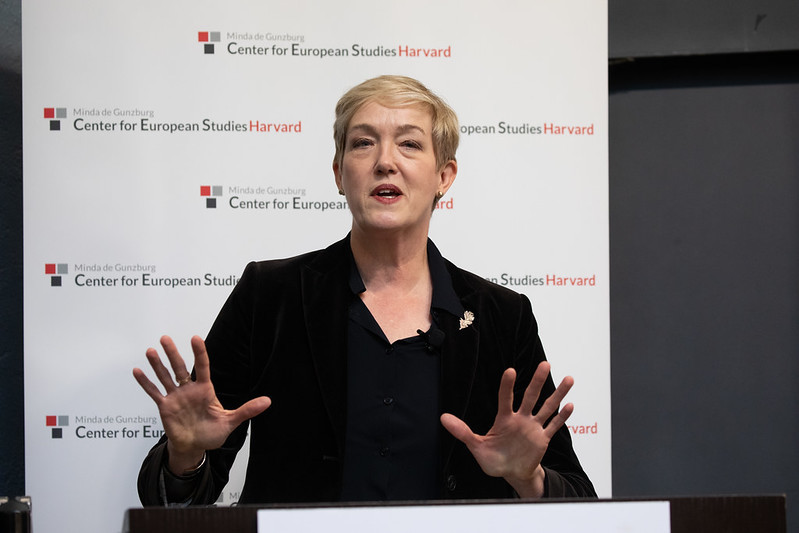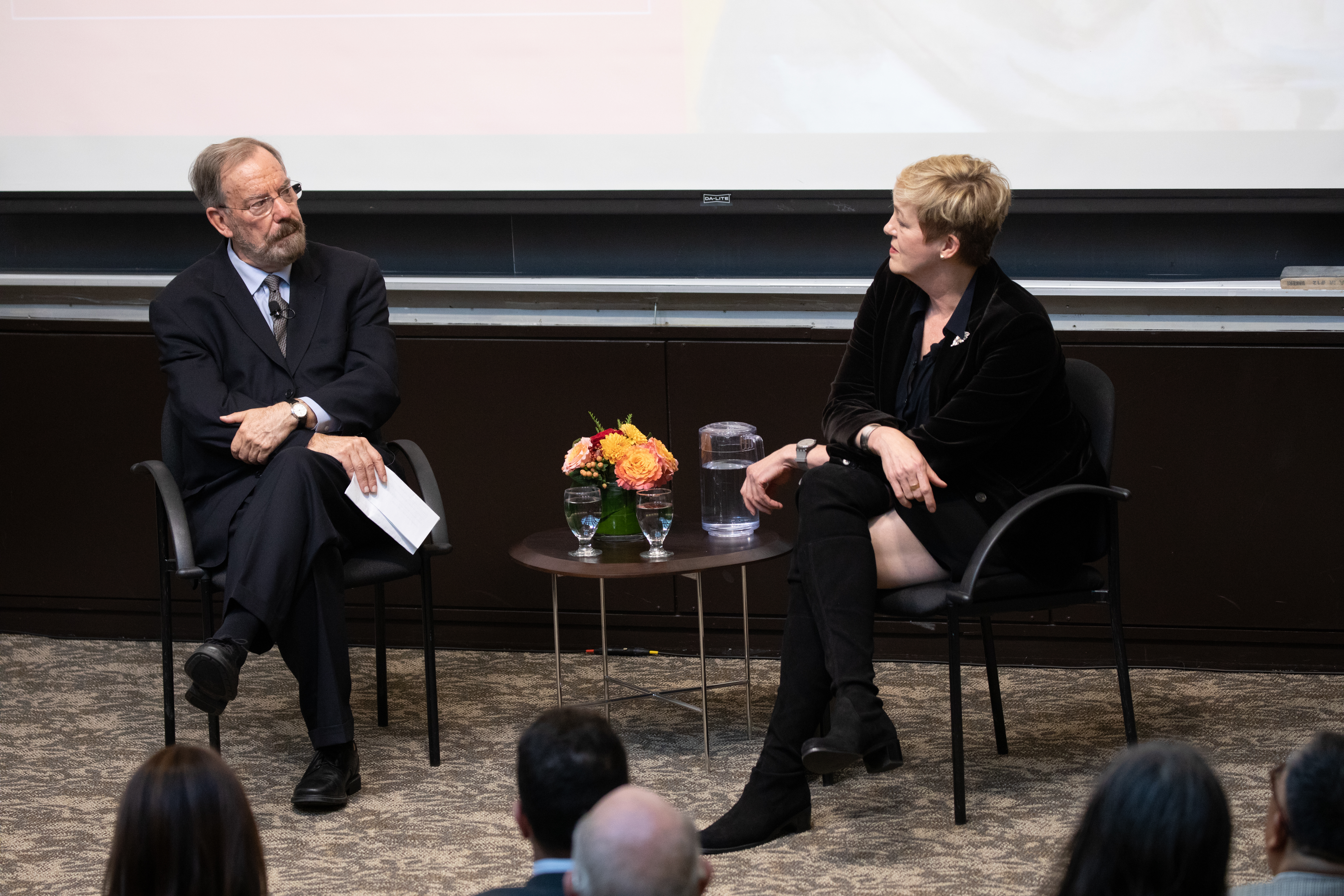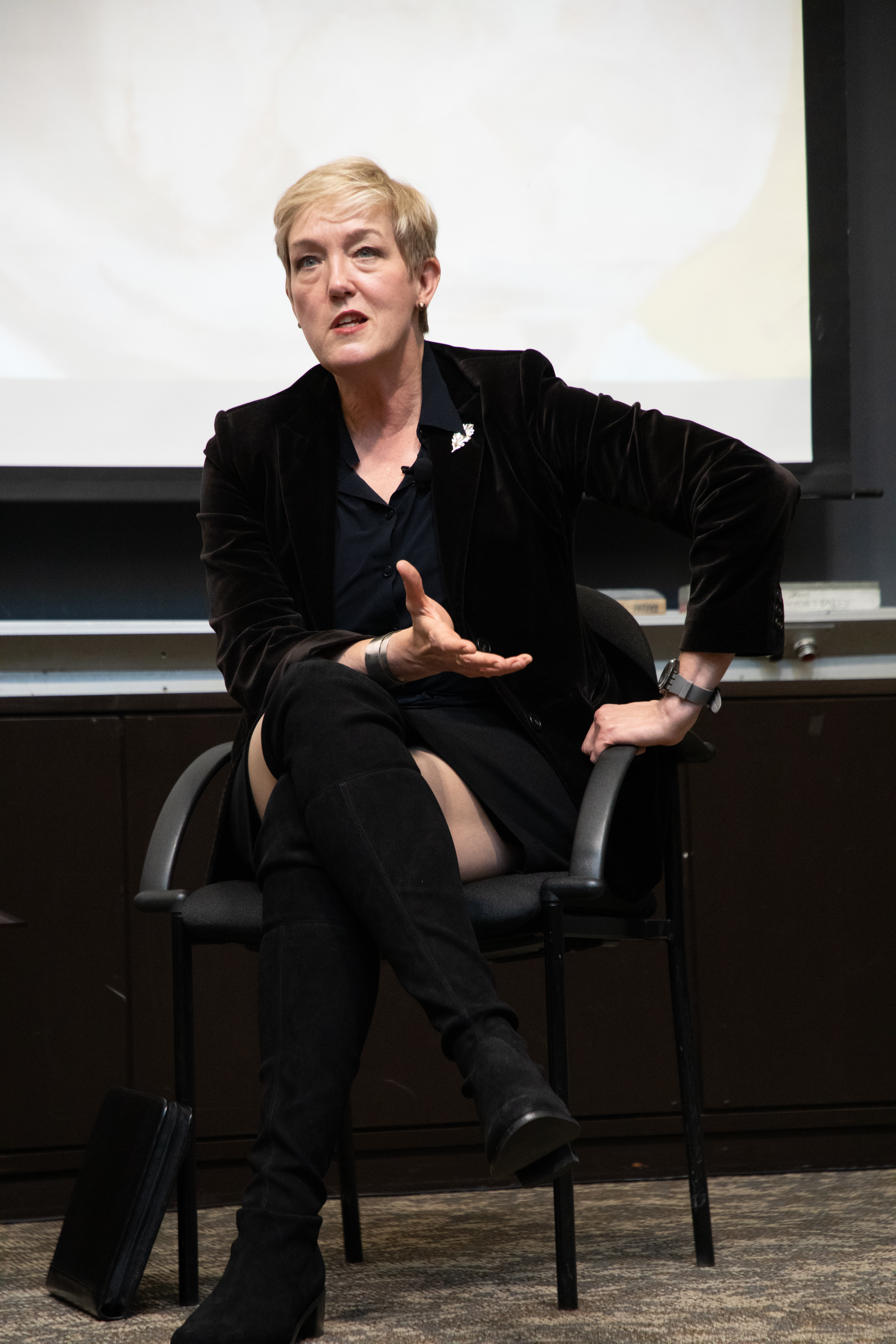Constanze Stelzenmüller frames responses to Putin’s assault on the West in lecture to honor the legacy of Guido Goldman, CES co-founding director.
“We Western nations may not see ourselves as active participants in the war in Ukraine, but Russian leader Vladimir Putin does — and we must act accordingly.” That was the cautionary thrust of Constanze Stelzenmüller’s address on Friday, November 4, 2022. Delivering the annual Guido Goldman Lecture on Germany, Stelzenmüller, the director of the Center on the United States and Europe and Fritz Stern Chair on Germany and trans-Atlantic Relations at Brookings, spoke on “The Free World and Its Enemies: What Putin’s War and China’s Global Ambitions Mean for Us.” The lecture series, established in 2018 by the Minda de Gunzburg Center for European Studies (CES), was followed by a discussion between Stelzenmüller and Peter Hall, Krupp Foundation Professor of European Studies at Harvard and CES Resident Faculty.
 The talk was one of the highlights of the special day-long tribute “Guido Goldman: Celebration of Life.” The event, held belatedly due to the pandemic, served as a public memorial for Goldman, the co-founder of the Center, who died in December 2020, and whose earlier public memorials were precluded by the pandemic. Goldman had selected Stelzenmüller to give this address, and in her opening remarks, she paid tribute to her mentor on what would have been his 85th birthday.
The talk was one of the highlights of the special day-long tribute “Guido Goldman: Celebration of Life.” The event, held belatedly due to the pandemic, served as a public memorial for Goldman, the co-founder of the Center, who died in December 2020, and whose earlier public memorials were precluded by the pandemic. Goldman had selected Stelzenmüller to give this address, and in her opening remarks, she paid tribute to her mentor on what would have been his 85th birthday.
“Guido was indeed a builder of bridges, especially for a generation of post-war German politicians for whom he opened doors in Washington and thereby also helping to smooth the path of reconciliation and trust building between Germany and its former enemies,” she said. Stelzenmüller praised Goldman as a “builder of institutions” and “a cultivator of deep and lasting friendships.”
Following her fond remembrances of Goldman, Stelzenmüller turned to her topic. Quoting her Brookings colleague and former analyst and deputy assistant to the U.S. National Security Council Fiona Hill, Stelzenmüller stated that Putin sees this as a “full-on war with the West,” seeking “nothing less than the rollback of the democratic transformation in Eastern Europe, the neutralization of Western Europe, and the departure of America from the continent.”
Noting that war has returned to Europe, she outlined seven propositions. First, she said, “we must give Ukraine what it needs to defend itself without delay.” Second, because “Putin is in a war with us whether we like it or not,” she noted “we must urgently see to our own deterrence, defense, and resilience.”
This war is far from over, she stated as her third proposition. At best, she said, “we are at the end of the beginning.” Fourth, allied cohesion is and will continue to be brutally tested. Although it may not be surprising that non-aligned nations, like India and Mexico, have hesitated in joining with the West, she pointed out how even Turkey, a NATO member, has been “acting as a swing state” between Russia and the West in this conflict.
Russia, however, is not the only threat. For her fifth proposition, she quoted Thomas Haldenwang, president of the German Federal Office for the Protection of the Constitution, simply put, “Russia is the storm. China is climate change.” She noted the threat of “a strategic ice age” coming to Europe and the growing power of China. “China is watching Russia’s war and the West’s defense of Ukraine,” she said. With China seeking to establish its own version of global order amid the chaos of war and its aftermath, she called on the West to “reduce and mitigate our dependence” on the burgeoning superpower and express gratitude to the Biden administration for its “muscular and remarkably patient and collaborative leadership.”
 Returning to the title of her lecture for a sixth proposition, Stelzenmüller stated, “enmity has returned to the post-Cold War world.” Referring to philosopher Karl Popper’s 1945 work “The Open Society and Its Enemies,” she discussed the ongoing relevance of the “virtues … foundational for a free and open society.” First among these, she reiterated, is “a commitment to reason and criticism as well as opposition to essentialism, determinism, and totalitarianism.”
Returning to the title of her lecture for a sixth proposition, Stelzenmüller stated, “enmity has returned to the post-Cold War world.” Referring to philosopher Karl Popper’s 1945 work “The Open Society and Its Enemies,” she discussed the ongoing relevance of the “virtues … foundational for a free and open society.” First among these, she reiterated, is “a commitment to reason and criticism as well as opposition to essentialism, determinism, and totalitarianism.”
This commitment requires Western liberal democracies to recognize the scope of the threat from Russia and China in addition to challenges coming from internal forces of populist nativism spurred on by outside forces. “We the free democracies must face the fact that we have adversaries who consider us to be absolute adversaries – existentially different and alien,” she said.
Turning inward, Stelzenmüller concluded her list of propositions by acknowledging that “no country in Europe is as vulnerable and under-prepared for all of this as Germany.” Although Germany has “given shelter to nearly a million Ukrainian refugees” and is working to disengage from Russian energy, Stelzenmüller pointed out that her country is still struggling. Despite a special acquisition fund, for example, Germany is still far from fulfilling its pledge of 2% defense spending to NATO and is instead stalled at 1.44%.
In addition, worrying trends including an increase of attacks on refugee housing and a rise in disinformation, threaten future progress. “We refused to listen to our neighbors on Nord Stream II,” she said. “On corruption, on energy dependence on Russia … and China gearing up to weaponize our trade relationship. By ignoring those warnings and refusing to stand up to Putin, we enabled this aggression and earned the lasting distrust of our allies,” she said. In response, Stelzenmüller said, Germany must now work to “lean into the defense and reconstruction of Ukraine.” In addition, she called on all Western democracies to become “more resilient to interference and interruption. “Time is of the essence on the battlefield now,” she said. “When we defend Ukraine, we are defending ourselves.”

Following Stelzenmüller’s stirring address, Hall asked for her forecast. “I don’t think it would be very healthy for Putin to stop, so I think it goes on until it ends,” she said, closing the door on the possibility of negotiation, at least at this point.
Noting how Germany has “underfunded and disinvested in its armed forces” for decades and with Europe and the United States already seeing inflation and spiking energy costs, Stelzenmüller predicted a difficult period – with next winter being harder than this year’s. However, she also expressed some optimism. “We know from World War II what allied countries can do if we need to,” she said. “We might be heading in that direction.”
Asked about Putin’s continued threats to deploy his nuclear arsenal, she struck a pessimistic note: “We are already at the point where nuclear non-proliferation is hanging by a thread.” That said, she salvaged some hope that German Chancellor Olaf Scholz had managed to extract a statement from Chinese President Xi Jinping that Russia risked “crossing a line” if it resorted to nuclear force.
“If anybody can tell Putin anything, it would be Xi Jinping,” said Stelzenmüller. While acknowledging that the lasting impact of this statement is up in the air, for now “it is a good thing because it put up a red flag.”